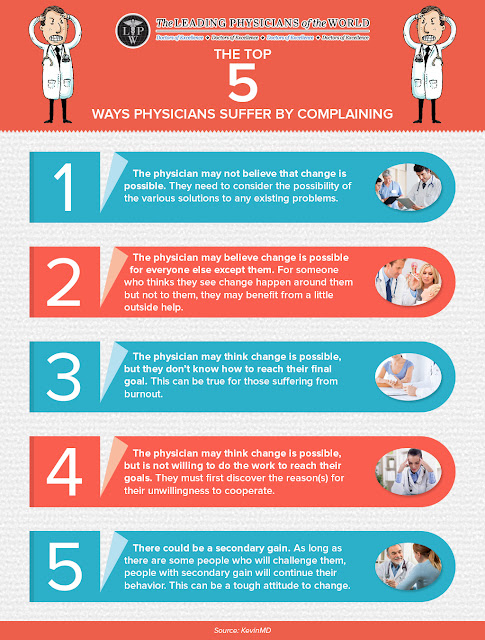The Top 5 Ways Physicians Suffer By Complaning
There’s
a saying: “Pain is inevitable, but suffering is optional.” However, some people
thrive by complaining. These people, when presented with potential solutions to
the problem, argue and invalidate all possibilities presented. Sounds familiar?
While there are frontline physicians — even physician leaders — who gladly get
on board, looking at and for new solutions to what seems to be an unsolvable
problem, many of our community are content to remain in their resigned
cynicism, shooting down every possibility that surfaces without consideration.
Complaining about the same thing over and over again and never taking action,
may indicate an underlying commitment to suffering. Here are some examples.
- The physician doesn’t believe change is possible. Physicians who believe change isn’t possible have a deep ingrained resignation and cynicism present. These are the people who when presented with possibility, shoot it down immediately. Perhaps it’s because they’ve been in the industry so long and have seen so many before them attempt to change the system that they just can’t see possibility anymore. Perhaps they have attempted to affect change and failed. Either way, they kill possibilities at every turn. The opportunity for them is to see that there is light in the tunnel and that they can be a part of that light if they just consider the possibility of the various solutions and strategies presented.
- A physician believes change is possible for everyone except them. These may be people who have seen success or change happen around them, but have not yet experienced it for themselves. They may even be taking some action (albeit ineffective or inconsistent). However, after time, the resignation sinks in, and they come to believe that everybody can have it “except me.” They simply need new actions and pathways to produce new results. The opportunity for these doctors is to understand that everyone (including them) has a blind spot, and the new actions to take that would be effective for him or her may just be in theirs. They might potentially benefit from a little outside guidance from someone who can see that blind spot, reveal it to them and empower and hold them accountable for new actions.
- There is a secondary gain. For some, this is a hard pill to swallow. But often if there is chronic complaining and unwillingness to be responsible for change, it is possible that there is a secondary gain. When this is the case, it’s important to look at what and how big is the secondary gain. For some, it is simply attention (good or bad). Some physicians (and people in general for that matter) like the thrill of “the fight.” They love challenging and being challenged. As long as there are people with whom they can rattle, they will continue their behavior. Usually, with their secondary gain, there’s more than one person involved. Change becomes difficult if the involved parties are not willing to remove the incentive.
Recognizing
yourself in these patterns can be hard, but if you truly desire change in the
undesirable circumstances in your life and career, youmust
be willing to tell the truth about how you are currently operating in the
world. When you impart the principle of mindfulness, you can then be
responsible for where you are and take action to move to the next level.




Comments
Post a Comment